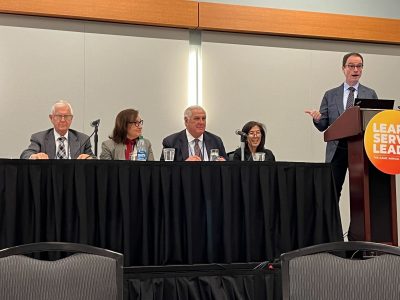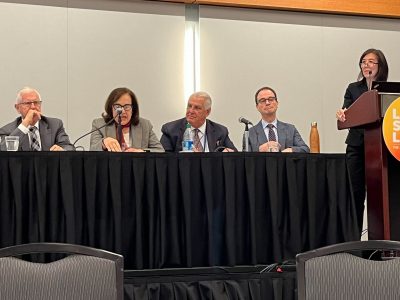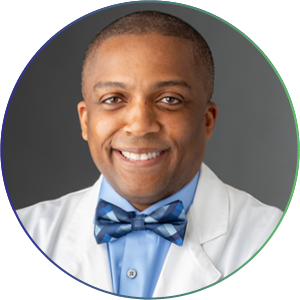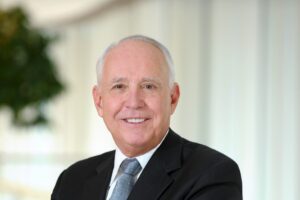Gold Humanism Honor Society panel at the 2022 AAMC Annual Meeting featured insights from leaders in medical education

From left to right, Dr. Lawrence Smith, Dr. Annette C. Reboli, Dr. Pedro “Joe” Greer, Jr., Dr. Kathleen Kashima and Dr. Gregory Cherr.
“Truly, the human connection is the very foundation of the best patient care and a critical factor in clinician wellbeing,” said Gold Trustee Dr. Gregory Cherr in his introductory remarks. Dr. Cherr is Professor of Surgery, Senior Associate Dean for GME, and DIO at Jacobs School of Medicine and Biomed Sciences at the University of Buffalo, as well as Chair of the GHHS Advisory Council. “Yet humanism can sometimes feel like it has been squeezed into extra pockets of time tacked onto the curriculum. It can even feel sometimes like an afterthought. But what if you could start from scratch? Start from the very beginning?”
The panel, titled “A Conversation with Founding Deans – Embedding Humanism and Making it Stick,” included Dr. Pedro “Joe” Greer, Jr., Founding Dean of the College of Medicine at Roseman University and Gold Trustee; Dr. Annette C. Reboli, Dean of Cooper Medical School at Rowan University and Founding Vice Dean; and Dr. Lawrence Smith, Founding Dean and Dean Emeritus at Zucker School of Medicine at Hofstra/Northwell and Gold Trustee. Dr. Smith also presented this year’s Jordan J. Cohen Humanism in Medicine Lecture at the AAMC conference.
Dr. Kathleen Kashima, Senior Associate Dean of Students at University of Illinois, and former Chair of the GHHS Advisory Council, served as the “Ignitor,” sparking a lively conversation.
The panel spoke about the evolution of their schools, from the first steps of crafting a mission statement to how they recruit students, residents, and faculty for whom humanism is not an afterthought, but a core value of their professional and personal lives.
They also highlighted programs and initiatives that give their students a unique take on patient care from a humanistic perspective.
Dr. Greer spoke about the importance of teaching students about social and economic policy, subjects that may not necessarily be ingrained into the average medical school curriculum, but that directly affect people’s health and quality of life. “Even though we want to produce physicians for the world,” said Dr. Greer, “we’re responsible for the communities that we’re embedded in.”
He described a program called household-centered care, in which students get longitudinal experience caring for an underserved household over all four years of training. This program was part of the curriculum at Dr. Greer’s previous institution, Florida International University Herbert Wertheim College of Medicine, and will now be embedded at the College of Medicine at Roseman University.

At right, Dr. Kathleen Kashima, Senior Associate Dean of Students at University of Illinois, and former Chair of the GHHS Advisory Council, serving as the “Ignitor,” sparking a lively conversation.
Students are trained not to ask “How do you feel?” but instead, “What is your most urgent need?” This distinction teaches students that what they might consider important (for example, a colonoscopy or other screening) may not be in line with the patient’s most pressing concern (such as whether missing work to have the colonoscopy could affect their ability to pay the rent).
“We take the student away from the clinic and we put him in somebody’s home, which completely changes that power differential,” said Dr. Greer. “Now they learn that the physician cannot always be the king and the queen. Sometimes we’re the one that has the least amount of knowledge.”
Dr. Smith also emphasized the importance of sending students out into the community. He described how in the first few months of medical school, students at Zucker School of Medicine work with the ambulance system of Northwell Health, seeing patients not in a typical hospital setting but in homes, on the street, or wherever the patient needs care. At the end of this time, students take an exam to become licensed EMTs.
Highlighting another program at Zucker School of Medicine, Dr. Smith spoke about curricular time that is dedicated to learning how to process complicated experiences and emotions.
“We felt that the thing that was often missed in medical schools was time to reflect on the unbelievable experiences that were going to change you forever as to who you were,” said Dr. Smith. “You were somebody else. And you’re going to leave a doctor, maybe not a fully trained doctor, but you’re going to leave a doctor.
“And so we have reflection as one of our core values. We are committed to embedding in all of our learning experiences the time and skills necessary to consciously examine, interpret, and understand the thoughts and feelings that emanate from intense patient encounters.”
At Cooper Medical School, Dr. Reboli noted, students are required to engage in service learning as part of the curriculum. Last year, 100 students completed 16,000 hours of service in a variety of projects, including working with young people in the community and participating in a street medicine project. “Over time, the students are able to connect the dots to what they’re seeing in the medical environment,” said Dr. Reboli.
She also highlighted the Center for Humanism at Cooper Medical School, which works across the continuum, engaging with students, physicians, nurses, and other healthcare team members.
According to Dr. Greer, nurturing students’ creativity and critical thinking skills is paramount. “When we produce physicians for the future, the medical landscape is changing so quickly,” he said. “If they cannot be creative, if they cannot be critical, they aren’t going to be real leaders.”
His students also do a lot of narrative and reflective writing, because, as Dr. Greer notes, “If you can’t tell a story, you can’t make a change.”
This panel was sponsored by the Gold Humanism Honor Society, which hosts an event each year at the AAMC Annual Meeting to highlight examples of work underway to elevate humanism in schools and care settings. Learn more about GHHS.
The Gold Foundation counts the AAMC as one its strongest partners, and each year hosts several sessions at the annual meeting. Read more about the Gold events at the 2022 Learn Serve Lead meeting.

